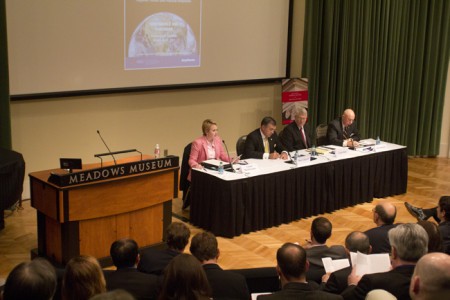
A little more than a week after the U.S. government ended its nearly month-long sequester over budget disagreements, SMU’s Tower Center addressed the budget question head-on, and not just from the American perspective.
This year’s National Security Conference, “Making Strategy Under Budget Austerity,” instead continued the discussion from the preceding Tower Center events of this fall to investigate and build upon the points of international conversation currently driving the global playing field.
In fact, the first panel Thursday focused on the effect of budget disagreements and sequestration on U.S. relations outside its borders.
Within the country’s own historical context, the most recent sequestration and inability to pass a budget should not have come as too big a shock. In his opening statements, General Peter Chiarelli said while many are saying “the budget sequester was a success,” one needs to “get closer to the problem to understand” just how easy or hard the question of budgeting is.
“Since 1954, Congress has passed, on time, four budgets. Four budgets since 1954,” Chiarelli said. “When you look at the sequester cuts, you have to remember that there are only certain places you can cut [from] and get away with it.”
Chiarelli, who served as the Army vice chief of staff and thus was given the task of that military budget, spoke from experience when explaining the lack of understanding of “the tremendous inefficiencies” when a budget resolution is not met.
Cuts need to be made, “but the hardest thing to cut…is a program that is delivering what it is supposed to deliver,” Chiarelli said. Chiarelli gave instances from his work when programs were being cut to allow for other budget needs that had, overtime, become more routine than necessary.
And even if there may appear to be an “obvious” opportunity to cut something from budget, it isn’t always followed through on, as demonstrated by examples of Congress’ work over the past few decades.
The understanding of the budget sequestration is one that differs greatly in Washington D.C. versus the rest of the nation, according to SMU professor Joshua Rovner. He explained that the “ongoing budget uncertainties” have serious consequences, and the lack of understanding can further ignite these.
“There’s what the budget should look like in theory, and then the reality of doing it,” Rovner said. “You have to understand the messy and the gritty…If you ignore the nuts and bolts, you’ll have no understanding of how it happens.”
Budget sequestration and strategies during such times, however, reach well beyond the American walls.
Jeremy Shapiro, a Visiting fellow in the Foreign Policy program at the Brookings Institution, spoke on the U.S. European alliance, a system he said “is the key to American strength;” a fact that, according to Shapiro, “is particularly true to a time of budget austerity.”
“These countries can fight with us and they can support us,” Shapiro said of the U.S.’s European alliances. Despite the Euro crisis, “Europe is fundamentally stable…and I think it remains fundamentally stable.”
Europe allows the U.S. “to access a lot of the others threatened around Europe,” such as the Middle East, that it wouldn’t otherwise be able to access. However, this country’s focus on these international affairs from its own perspective could, in the end, damage the very relationship that allows much of the work to be done.
“The alliance may fade simply from neglect,” Shapiro said, citing “the fact that U.S. priorities seem to be elsewhere” rather than being “concerned with…European problems.”
But it’s a two-way street, according to Shapiro. The alliance with Europe is one that needs to be updated — what needs to happen is a “reconceptualizing [of] the…alliance for U.S. and European global priorities.” Shapiro said due to constant changes in international relations and issues, “the old alliance…is not responsive to U.S. needs.”
Rather, Shapiro drew attention to what he referred to as a “free-riding problem” on the part of Europe. The European countries provide “legitimacy to the types of activities the U.S. wants to carry out” in the surrounding regions, and Europe carries none of the burdens while still receiving the protection.
“It’s only rational to be a free rider in a situation like this,” Shapiro said. “But it will kill the alliance in a time of austerity.”
Many working in the international field are talking about the “Asian pivot” that could also deteriorate U.S.-Euro alliances — as China and Japan grow in importance on the international spectrum, the U.S. could shift its priorities completely.
Shapiro himself did not entirely buy into the notion, and Admiral Patrick Walsh, former Commander of the U.S. Pacific Fleet, looked specifically at the growing U.S. focus on the South China Sea.
“The reality of dealing with the Asia Pacific region…is that we’re dealing with the immensity of the region in a world that’s very integrative,” Walsh said, citing in particular the “explosive growth” the China region has seen over the past several decades. “The span of [U.S. and global] interest is not only wide, but diverse.”
The South China Sea is essential in international waters for trade and military travel. Walsh explained “the sea serves as the essential conduit that powers” an entire international system, and the “bulk” of the competing national interests and “regional and international disputes” now “travel by sea.”
“Sea power has returned to preeminence,” Walsh said of national power in the region.
He explained that “relatively few topics have the potential to determine” such significant outcomes as does the South China Sea and China’s role in all of it. And it’s a topic that is here and now, asserted Walsh.
“We can’t look at the escalating tension in the region as something [still] over the horizon,” Walsh said.
The next step, he said, is “dialogue.”
“Everyone shares risks in [the maritime] environment,” Walsh said. “When we know each other’s interests [in the region]…we can begin to build confidence among nations.”








